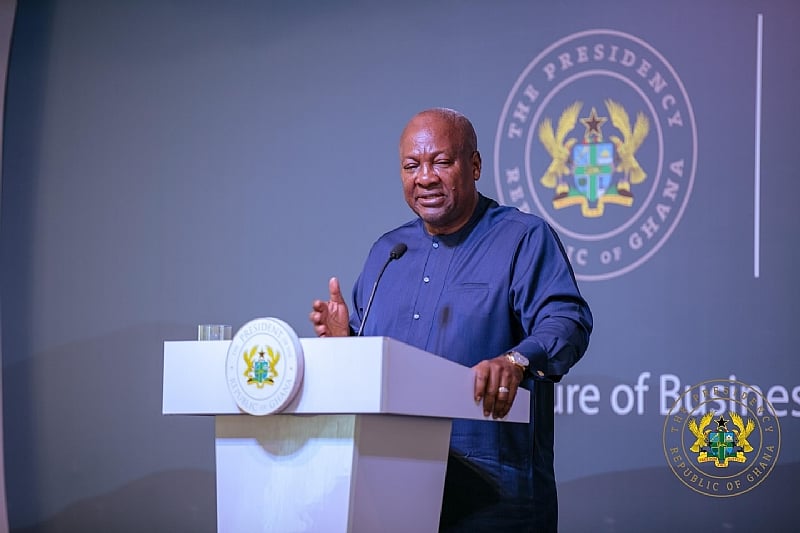President John Dramani Mahama has credited Ghana’s improved credit rating by Fitch Ratings to his government’s disciplined and strategic approach to economic recovery.
Fitch recently raised Ghana’s Long-Term Foreign-Currency Issuer Default Rating (IDR) from ‘Restricted Default’ to ‘B-’ with a Stable Outlook, signaling renewed investor confidence in the country’s fiscal trajectory.
Speaking at the 2025 Ghana-European Union Partnership Dialogue in Accra, President Mahama said the rating reflects “prudent economic management” and a growing sense of macroeconomic stability.
The high-level meeting brought together all 10 EU resident ambassadors in Ghana, alongside over 10 Ghanaian Ministers of State, to reaffirm cooperation between Ghana and the European Union.
Addressing the gathering, President Mahama emphasized that the Ghanaian economy was rebounding due to disciplined fiscal policies, improved revenue mobilization, and smarter expenditure controls.
Working closely with the Bank of Ghana, he said, the government has taken bold steps to stabilize inflation, strengthen the cedi, and carry out debt restructuring—all measures that are beginning to bear fruit.
“These efforts… only yesterday, the fixed rate exchange agency upgraded Ghana’s credit outlook to a B-minus stable outlook,” the President noted.
Beyond macroeconomic stability, Mahama said the government is pushing forward with structural reforms to reduce inefficiencies and improve transparency. “We are also pursuing regulatory and institutional reforms that promote transparency, reduce inefficiencies, and expand our fiscal base,” he added.
He thanked the EU for its continued support in public financial management, domestic revenue reform, and anti-corruption efforts—pillars he described as essential to sustainable growth.
Recognizing the limits of state-led development, President Mahama said Ghana is banking on the private sector to drive transformation. He pointed to reforms including a unified business licensing regime and a structured public-private dialogue framework aimed at mainstreaming the voice of business in policymaking.
He further noted that Ghana is introducing a Regulatory Impact Assessment (RIA) model “anchoring decisions in data, ensuring predictability, and improving Ghana’s competitiveness in the global market.”
“We therefore welcome EU businesses and investors to participate in this transformative journey, especially as we revise the Ghana Investment Promotion Centre Act to promote joint ventures and deeper technology transfer,” he said.
Mahama reaffirmed Ghana’s ambition to become a regional hub for sustainable agribusiness, value addition, manufacturing, and digital innovation—areas where European expertise and investment are crucial.
EU Ambassador to Ghana, Mr. Irchad Razaaly, praised Ghana’s leadership on the global stage, especially during its term at the UN Security Council and current role on the Human Rights Council.
“I would like to acknowledge the constructive role that Ghana has played at the UN Security Council… and Ghana’s unwavering support as well to increase territorial integrity and sovereignty in the face of the racial migration,” he said.
Foreign Affairs Minister Samuel Okudzeto Ablakwa echoed the need to deepen climate cooperation, highlighting Ghana’s push for green growth through renewable energy and environmental preservation.
He appealed for stronger EU support in unlocking access to climate finance, carbon market funds, and green investments to help Ghana meet its commitments under the Paris Agreement and UN Sustainable Development Goals.


